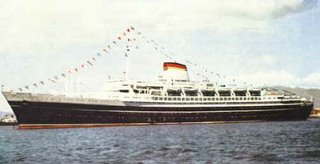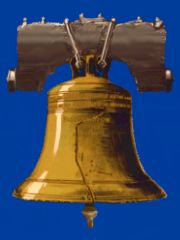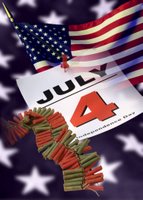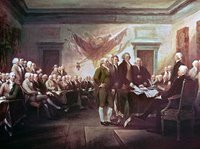On July 25, 1956, while sailing off the coast of Nantucket, Massachusetts bound for New York City, the SS Andrea Doria collided with the eastward-bound SS Stockholm of the Swedish-American Line in what was to become one of history's most famous maritime disasters. Struck in the side, the position (list) of the mortally wounded ship left half of Andrea Doria's lifeboats unusable, which might have resulted in significant loss of life, but improvements in communications and rapid responses by other ships averted a disaster similar in scale to the Titanic disaster of 1912. Most passengers and crew survived. The evacuated luxury liner capsized and sank the following morning.
New York City, the SS Andrea Doria collided with the eastward-bound SS Stockholm of the Swedish-American Line in what was to become one of history's most famous maritime disasters. Struck in the side, the position (list) of the mortally wounded ship left half of Andrea Doria's lifeboats unusable, which might have resulted in significant loss of life, but improvements in communications and rapid responses by other ships averted a disaster similar in scale to the Titanic disaster of 1912. Most passengers and crew survived. The evacuated luxury liner capsized and sank the following morning.
The incident and the aftermath were heavily covered by the news media. While the rescue efforts were both successful and commendable, the cause of the collision and the capsizing and sinking of the Andrea Doria afterward generated much interest in the media, and many lawsuits. The Andrea Doria was the last major transatlantic passenger vessel to sink before airplanes became the preferred method of travel.
Wednesday, July 26, 2006
Today in History
Posted by
Tamera Pelikan
at
Wednesday, July 26, 2006
0
comments
![]()
Monday, July 10, 2006
Monday Ladies

Hello to all of my Monday English students. Tonight's entry is especially for you:
How did you feel about English today? Did you feel like you were understanding more and more? Here are a few more reasons to keep studying English ...
Remember:
About 1,500,000,000 people in the world speak English. Another 1,000,000,000 are learning it.
- 75% of the world's letters and postcards are written in English.
- Almost all international conferences and competitions are conducted in English. For example, the Olympics and the Miss World contest.
- Diplomats and politicians from different countries use English to communicate with each other. English is the main language of organizations like the United Nations, NATO, and the European Free Trade Association.
- Travel will be more easy. You will communicate with people wherever you go — English is spoken in more than 100 countries. You can ask directions, have a conversation, or... ask for help. Who knows, maybe English will even save someone's life someday!
A NEW ENGLISH CHALLENGE
Studying English for just 15 minutes every day gives you much better results than studying for a whole day twice a month.
Posted by
Tamera Pelikan
at
Monday, July 10, 2006
1 comments
![]()
Saturday, July 8, 2006
Liberty Bell Rings - July 8th, 1776
July 8th, 1776
The Liberty Bell was situated in the tower of the USA's capital building (at the time) the Pennsylvania State House (now known as Independence Hall). It rang to summon citizens to hear the reading of the Declaration of Independence which had been adopted on July 4th 1776.
The bell has the following inscription on it:
"Proclaim Liberty Throughout All the Land unto All the Inhabitants Thereof"
At the close of the reading the bell in the cupola pealed forth the glad tidings of the birth of the Nation and the spectators "gave their hearty consent with three loud huzzas and cried out "May God long preserve and unite the Free and Independent States of America."
Posted by
Tamera Pelikan
at
Saturday, July 08, 2006
0
comments
![]()
Saturday, July 1, 2006
Independence Day
It's just a few days before the 4th of July, so I thought a little  history review might be in order .... It's fun for me to remember what it's all about too!
history review might be in order .... It's fun for me to remember what it's all about too!
"The second day of July, 1776, will be the most memorable epoch in the history of America. I am apt to believe that it will be celebrated by succeeding generations as the great anniversary festival. It ought to be commemorated as the day of deliverance, by solemn acts of devotion to God Almighty. It ought to be solemnized with pomp and parade, with shows, games, sports, guns, bells, bonfires, and illuminations, from one end of this continent to the other, from this time forward forever more."
When John Adams (the 1st Vice President and 2nd President of the United States) made the above statement, he was actually off by two days. Yes, the vote on July 2nd was the decisive act, but July 4th was/is the date of the Declaration itself.
The Declaration of Independence is the document in which American colonists proclaimed their freedom from British rule.  The Second Continental Congress, with representatives of the 13 British colonies in America, adopted the declaration on July 4, 1776. The document included an expression of the colonists’ grievances and their reasons for declaring freedom from Britain. The Declaration of Independence’s eloquent rhetoric and political significance rank it as one of the great historical documents.
The Second Continental Congress, with representatives of the 13 British colonies in America, adopted the declaration on July 4, 1776. The document included an expression of the colonists’ grievances and their reasons for declaring freedom from Britain. The Declaration of Independence’s eloquent rhetoric and political significance rank it as one of the great historical documents.
The first celebration took place in Philadelphia on July 8, 1776, four days after the Declaration of Independence was adopted. On that day the declaration was read aloud, city bells rang, and bands played. Within a few years the Fourth of July was observed throughout most of the new nation.
Today,  many Americans observe the Independence Day holiday by having parades, picnics, barbecues, or other outings with friends and family. Community fireworks displays take place in the evening. The Fourth of July fireworks displays in many large cities are broadcast on television.
many Americans observe the Independence Day holiday by having parades, picnics, barbecues, or other outings with friends and family. Community fireworks displays take place in the evening. The Fourth of July fireworks displays in many large cities are broadcast on television.
Learn more about this holiday:
http://www.sunniebunniezz.com/holiday/4ofjuly.htm
Read the Declaration of Independence text: http://www.imustread.com/html/declaration.html
Posted by
Tamera Pelikan
at
Saturday, July 01, 2006
0
comments
![]()






